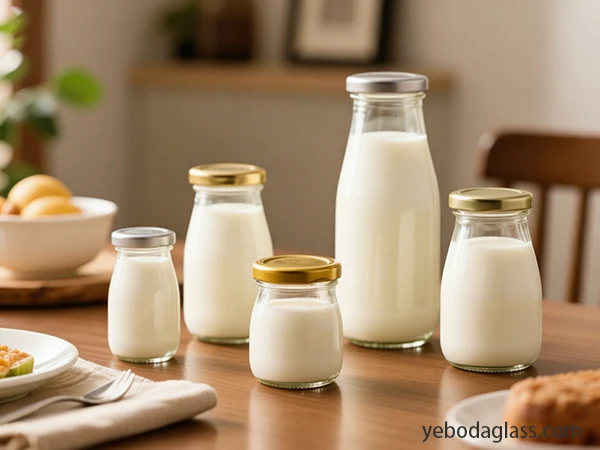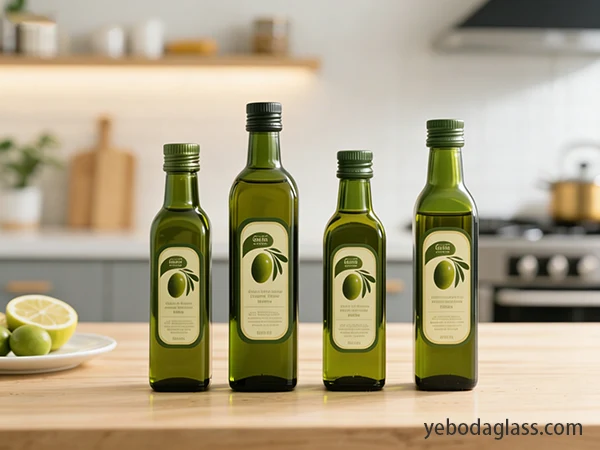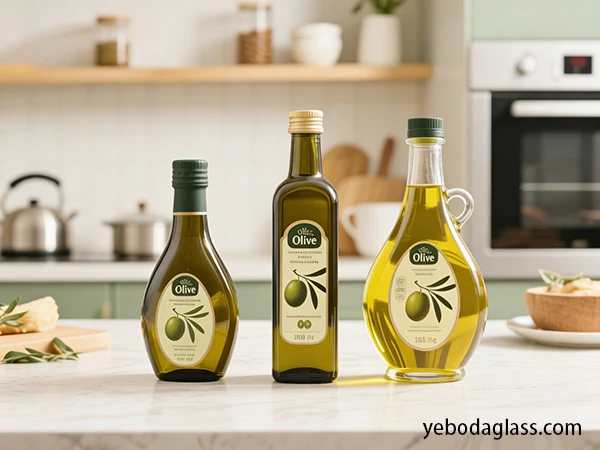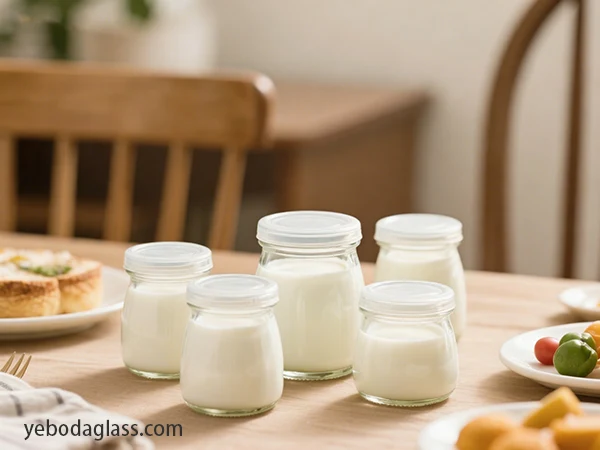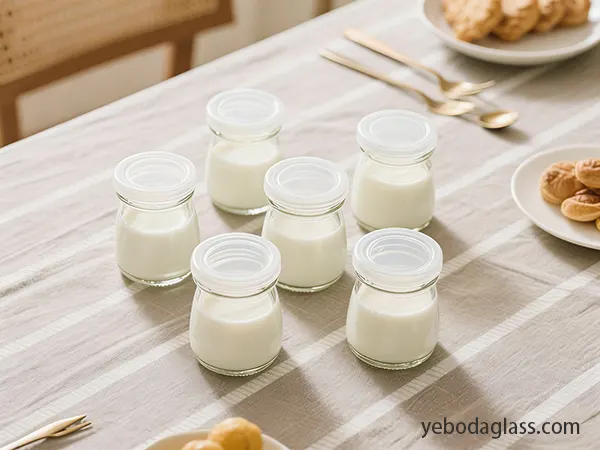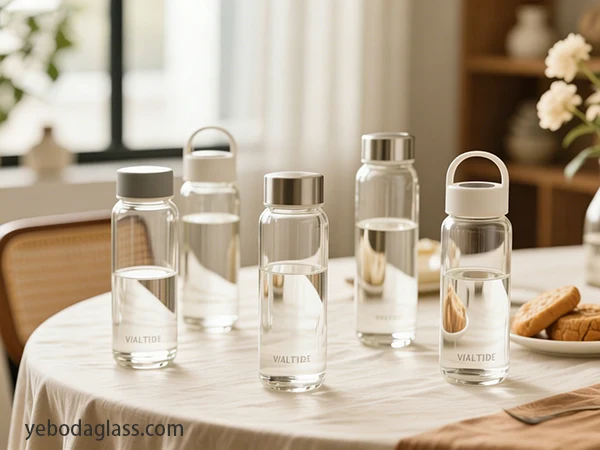Einleitung
Eine Fabrik für Einmachgläser, die sich mit der Lieferkette für Großabnehmer befasst, steht vor vielfältigen Herausforderungen und Chancen, die in diesem detaillierten Handbuch erläutert werden. Zu den behandelten Aspekten gehören die einfache Auswahl von Lieferanten, die Qualitätssicherung und eine optimierte Logistik. Das Dokument beschreibt das Produkt, geht über das Management des internationalen Handels und die Integration umweltfreundlicher Prozesse und präsentiert so eine vollständige Übersicht über lokale Lieferanten, die sowohl kostensparend als auch umweltschonend ist. Ziel ist es, Einkaufsteams und Supply-Chain-Managern das notwendige Wissen zu vermitteln, um die richtigen Entscheidungen zu treffen, Risiken zu minimieren und langfristige Partnerschaften mit führenden Herstellern von Einmachgläsern aufzubauen. Yeboda, ein Unternehmen, das für seine stabile, qualitativ hochwertige und innovative Produktion von Glasbehältern und Einmachgläsern bekannt ist.

Definition Ihrer Anforderungen an Einmachgläser im Großhandel
Der Erfolg von Großeinkäufen hängt maßgeblich von einer gut durchdachten Bedarfsanalyse ab. Die genaue Definition der Bedürfnisse Ihres Unternehmens ist ein entscheidender Schritt, um die richtigen Lieferanten zu finden und sicherzustellen, dass die Produkte am Markt Abnehmer finden und den Kundenwünschen entsprechen.
Primäre Verwendungszweck
Die geplante Anwendung wird die wichtigsten Spezifikationen der Einmachgläser aus Glas:
- Lebensmittelkonservierung/Einmachen: Erfordert lebensmittelechtes Natronkalkglas, Beständigkeit gegen Temperaturschocks und einen zweiteiligen Einmachdeckel, der mit dem Halsanschluss (Standard- oder Weithalsverschluss) kompatibel ist.
- Kerzenherstellung: Es ist abhängig von hitzebeständigem Glas, einer durchgehenden Gewindeoberfläche (CT) und einer ausreichenden Dicke, um Risse zu vermeiden.
- Getränke/Trinkgefäße: Im Fokus stehen Produktstabilität, Transparenz und ergonomisches Design. Dafür können auch spezielle Deckel (für Strohhalme, zum Ausgießen) oder besondere Griffe erforderlich sein.
- Lagerung/Organisation: Der Fokus liegt eher auf der Vielseitigkeit und den luftdichten Verschlussoptionen wie Klappdeckeln oder Dosierpumpen.
- Basteln/Dekoration: Das Hauptmerkmal ist die Schönheit des Gefäßes, die Einzigartigkeit seiner Form und die für Ätzung oder Bemalung vorbehandelte Oberfläche.
Schüttgutvolumen, das genau
Nur durch die Ermittlung des benötigten Volumens können wir die besten Preise und eine optimale Logistik gewährleisten:
- Paletten: Die richtige Warenmenge für Kleinunternehmen oder Testbestellungen (1.000–3.000 Gläser).
- LKW-Ladungen (FTL/LTL): Sind die beste Option für die regionale Verteilung (zehntausende Gläser).
- Container (20 Fuß/40 Fuß): Sind üblich für den weltweiten Warentransport von einer Einmachglasfabrik.
- In einen 20-Fuß-Container passen etwa 10–12 Paletten (etwa 10.000–30.000 Gläser).
- In einen 40-Fuß-Container passen etwa 20–24 Paletten (etwa 20.000–60.000 Gläser).
Wichtige Spezifikationen
Für eine gleichbleibende Qualität sollten Standards festgelegt werden durch:
- Größen: Neben der Angabe des Gewichts in Unzen oder des Volumens in Millilitern sollten Sie auch die Höhe, den Durchmesser und die Halsabmessungen angeben.
- Deckeltypen/Halsausführung: Beispiele für mögliche Spezifizierungen sind zweiteilige Deckel, Deckel mit durchgehendem Gewinde (CT), Ösendeckel oder Bügel- und Drahtdeckel.
- Material: Glas aus Natronkalk, Flintglas (klar) oder den farbigen Varianten (bernsteinfarben, kobaltblau, grün).
- Branding-Optionen: Bereiche zum Prägen, Tiefprägen, Siebdrucken, Abziehbildern oder Etikettieren.
- Glasgewicht & Temperung: Ein schwereres Einmachglas suggeriert nicht nur eine höhere Qualität, sondern ist bei ordnungsgemäßer Temperung auch widerstandsfähiger gegen Temperaturschocks.
Strategische Beschaffung: Geografische Überlegungen und Lieferantenidentifizierung für Ihre Mason Jar Factory
Strategische Beschaffung ermittelt die geeignetsten Produktionsstandorte unter Berücksichtigung von Kosten, Qualität und Logistik. Der Markt für Einmachglasfabriken ist global, mit Produktionsstätten in Asien, Europa und Nordamerika – jeder dieser Standorte bietet seine eigenen Vorteile.
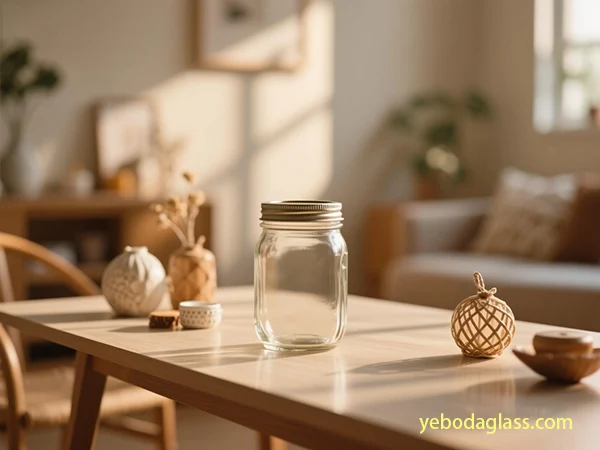
Beste Beschaffungsgebiete für Mason Jar-Fabriken
- Asien (z. B. China, Indien): Dieser Standort bietet Vorteile wie niedrige Produktionskosten, Massenfertigung und eine gute Anbindung an die Seehäfen. Yeboda ist ein chinesisches Unternehmen, das Einmachgläser herstellt. Dank Automatisierung und etablierter Lieferketten arbeitet die Produktion effizient, was Yeboda zum idealen Standort für Großbestellungen von Einmachgläsern macht.
- Europa (z. B. Deutschland, Italien): Hoch angesehen für die Herstellung von qualitativ hochwertigen Produkten Glasgefäße Reinheit und Präzision des Herstellungsprozesses sowie die strikte Einhaltung der Standards zeichnen dieses Produkt aus. Ideal für Luxusmarken, jedoch teurer.
- Nordamerika (z. B. USA, Mexiko): Die Lieferzeiten sind kürzer und die Kommunikation einfacher. Das Label „Made in USA“ ist ein hervorragendes Marketinginstrument, auch wenn die Kosten höher sind.
Standort des Werks und Lieferfaktoren
- Fertigungskapazitäten: Den Stand der Produktionstechnologie sollten Sie anhand von IS-Maschinen, Glühöfen und Inspektionssystemen ermitteln.
- Kosteneffizienz: Um ein genaues Maß für die Kosteneffizienz zu erhalten, sollten die gesamten Gesamtkosten (Werkspreis + Fracht + Zoll) ermittelt werden.
- Logistik: Die Nähe zu Häfen oder gute Straßenverbindungen tragen dazu bei, Waren schneller zu liefern.
- Rohstoffzugang: Glasfabriken, die sich in der Nähe von Quarz- und Kalksteinminen befinden, verfügen über eine stabile und günstige Rohstoffversorgung.
- Energiekosten: Weniger Energieverbrauch bedeutet niedrigere Energiekosten, was sich auch in den Glaspreisen niederschlagen wird.
Produktanpassung und technische Spezifikationen
Durch individuelle Gestaltung werden gewöhnliche Einmachgläser zu Unikaten und tragen zur Markenbildung bei. Hohes handwerkliches Können ist dabei nicht nur für die Ästhetik, sondern auch für die Funktionalität unerlässlich.
Technische Aspekte der Glaskonstruktion
- Glaszusammensetzung: Natronkalk und Flintglas werden verwendet, um das Material sowohl klar als auch fest zu halten.
- Farbglas: Die Farbe des Glases entsteht durch die Verwendung von Metalloxiden, die neben der Farbe auch den Schutz des Glases vor UV-Strahlen gewährleisten.
- Formgebungsprozess: Es werden Einzelteilmaschinen (IS-Maschinen) mit Blas- und Blas- oder Press- und Blastechnologie eingesetzt.
- Glühen: Die Kühlung wird so gesteuert, dass das Glas seine inneren Spannungen abbauen kann und dadurch haltbarer wird.
- Oberflächenbehandlungen: Sowohl die Heiß- als auch die Kaltbeschichtung dienen dazu, das Glas zu verstärken und gleichzeitig die Haftung des Etiketts zu verbessern.
Deckelmechanismen und Kompatibilität
Der korrekte Sitz des Deckels ist der Schlüssel zu einer guten Abdichtung:
- Ösen (Bügel und Draht), durchgehendes Gewinde, zweiteilige oder normale Einmachgläser oder Deckel für luftdichte Gläser.
- Für einen dichten Verschluss jedes Deckels ist das richtige Gewinde am Hals erforderlich.
Branding-Techniken
- Prägen/Vertiefen: Ein Branding, das dauerhaft ist und mit den Fingern gefühlt werden kann.
- Siebdruck: Es wird gebrannte Keramikfarbe verwendet, daher ist der Druck sehr haltbar.
- Organisches Drucken: Umweltfreundlich, aber weniger verschleißfest.
- Frosting & Spraying: Hilft dabei, die Oberfläche zu verändern oder die Farbe von hell nach dunkel zu verändern.
Massenlogistik, Import/Export und Lieferkettenmanagement
Die genaue Vorbereitung ist der wichtigste Aspekt beim Transport großer Mengen aus einer Einmachglasfabrik.
Containerisierung und Verpackung
- 20-Fuß-Container: 28–30 CBM für kleinere Sendungen.
- 40-Fuß-High-Cube: 68–70 CBM für Lieferungen mit größerem Volumen.
- Verpackung bedeutet: Ob lose, in Trays oder in Einzelkartons – Yeboda verwendet umweltfreundliche und verstärkte Verpackungsmaterialien für Einmachgläser.
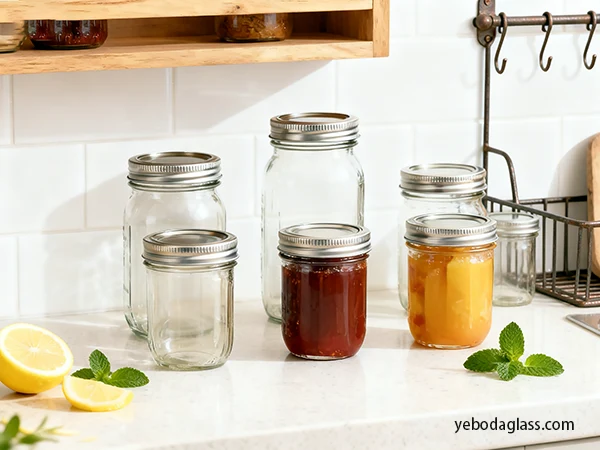
Handelsbestimmungen
- Incoterms: FOB und CIF werden üblicherweise für den Handel mit Glasgefäßen verwendet.
- Dokumentation: Korrekte HS-Codes, Rechnungen und Ursprungszeugnisse sind die Dokumente, die die Vermeidung von Wartezeiten gewährleisten.
Optimierung der Lieferkette
Der Einsatz von Bedarfsplanung, Supply-Chain-Management-Systemen (SRM), Just-in-Time-Fertigung und Routenoptimierung kann die Betriebskosten senken. Andererseits reduziert die Zusammenarbeit mit mehreren Lieferanten und die Bevorratung mit zusätzlichen Lagerbeständen das Risiko.
Kostenanalyse, Preismodelle und Verhandlungsstrategien
Die vollständige Kenntnis der Kostenpositionen ist der sicherste Weg, den richtigen Preis zu erzielen, wenn Sie eine Partnerschaft mit einem Hersteller von Einmachgläsern planen.
Preiskomponenten
Die gesamten zu tragenden Kosten setzen sich zu gleichen Teilen wie folgt zusammen: Ab-Werk-Preis, Fracht, Versicherung, Zölle und Inlandtransport.
Preismodelle
- EXW: Der Käufer trägt die gesamte Logistik.
- FOB: Wird im Allgemeinen für Massenexporte verwendet.
- CIF/DDP: Käufer, die Komplettservice-Optionen suchen und Wert auf einfache Transaktionen legen.
Verhandlungstechniken
- Nutzen Sie Mengenrabatte und langfristige Verträge als Verhandlungsinstrument.
- Verfügen Sie über ein tiefes Verständnis der Kostenstrukturen des Lieferanten.
- Einigung über Werkzeug- und Verpackungsinhalt.
Qualitätssicherung und Einhaltung gesetzlicher Vorschriften
Qualität und die Einhaltung von Vorschriften sind die Grundlage für zuverlässige Einmachgläser aus Glas.
Qualitätsprotokolle
- Rohmaterialprüfung, Belastungstests und AQL-Prüfung.
- Konsequente Vorversandkontrolle durch unabhängige Dritte.
Regulierungsstandards
- FDA, EU 1935/2004 und LFGB für Lebensmittelsicherheit.
- REACH und Prop 65 für Chemikaliensicherheit.
- Überprüfung der Ungiftigkeit von Schwermetallen in Glasfarbstoffen.
Risikominderung und Lieferantenmanagement
Eine gute Geschäftsbeziehung zu einem Hersteller von Einmachgläsern senkt nicht nur die Risiken, sondern verbessert auch die operative Stabilität.
- Lieferantendiversifizierung: Setze nicht alles auf eine Karte.
- Pufferbestand: Halten Sie immer Reserven für unvorhergesehene Situationen bereit.
- Verträge: Sklare Festlegung der Qualitäts-, Liefer- und Haftungsbedingungen.
- Regelmäßige Prüfungen: Überprüfung der Einhaltung von Vorschriften und kontinuierliche Verbesserung.
Neue Innovationen und nachhaltige Praktiken
Die Produktion moderner Einmachgläser entwickelt sich hin zu umweltfreundlicheren Verfahren.
Technologie- und Materialinnovation
- Reduzierung des Materialgewichts zur Kosten- und Emissionsersparnis.
- Hochpräzise IS-Steuerungssysteme für Formgebungsprozesse.
- Potenzial für intelligente Verpackungen (RFID/NFC-Integration).
Grüne Fertigung
- Immer mehr Hersteller greifen bei der Glasproduktion auf recycelte Glasfragmente zurück.
- Energieeffiziente Öfen (Sauerstoff-Brennstoff-, Elektroöfen) werden heute häufig eingesetzt.
- Durch Wasserrecyclingsysteme und die Nutzung erneuerbarer Energiequellen treibt das Werk seine Nachhaltigkeitsbemühungen weiter voran.
Strategische Nachhaltigkeit
- Die Zusammenarbeit mit umweltzertifizierten Fabriken kann das Nachhaltigkeitsimage Ihres Unternehmens stärken.
- Durchführung von Lebenszyklusanalysen (LCA),
- Die Einhaltung von Umweltauflagen sollte ein integraler Bestandteil der Unternehmensphilosophie sein.
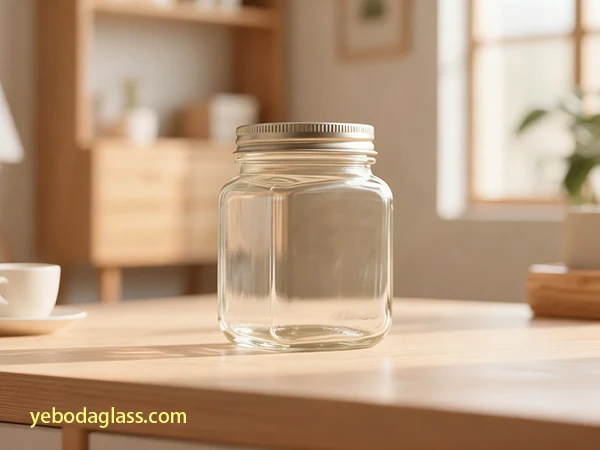
Abschluss
Eine ideale Partnerschaft mit einem Hersteller von Einmachgläsern sichert Lieferstabilität, Produktqualität und langfristige ökologische Nachhaltigkeit. Großabnehmer von Glas-Einmachgläsern sollten vorrangig nach Lieferanten suchen, die transparent arbeiten, sich für Nachhaltigkeit engagieren und eine solide Logistik gewährleisten. Yeboda ist ein Paradebeispiel für einen Einmachglashersteller, der diese Prinzipien nicht nur bei der Herstellung präzise gefertigter Gläser befolgt, sondern auch umweltbewusst produziert und einen zuverlässigen globalen Vertrieb bietet. Die Partnerschaft mit einem solchen Lieferanten bietet Vorteile wie Kosteneffizienz, Markenbekanntheit und langfristigen Erfolg im wettbewerbsintensiven Großhandelsmarkt für Glas-Einmachgläser.

